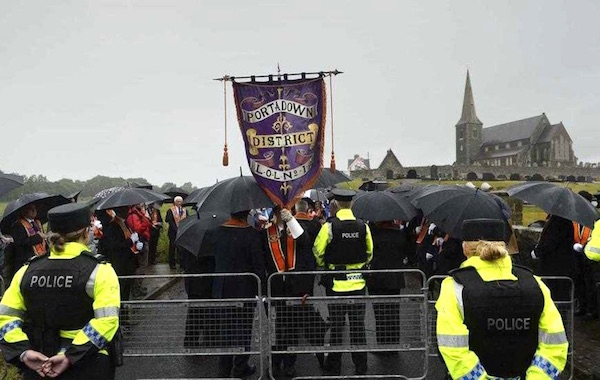
An Orange Order parade which was forced through the Ardoyne area of north Belfast last weekend has reopened the north’s biggest parading dispute.
A senior Orangeman has hailed what he said was the “resolution” of the Ardoyne parade standoff. He said it could offer fresh hope for a similar deal over the Portadown parade, for years the cause of intense riots and linked to a number of sectarian murders of Catholics.
Last Saturday morning, one of the north’s most contentious parades took place amid a huge policing operation as the PSNI forced the anti-Catholic Orange Order through a nationalist and republican community in north Belfast.
Orangemen hailed the march as a victory for their three-year intimidatory protest at nearby Twaddell Avenue, where there had been frequent disturbances and occasional violence. The illegal three-year camp had been maintain on government property by the paramilitary UVF, but has now been removed.
Orangemen now believe a precedent has been set for a ‘return’ parade along the nationalist Garvaghy Road in Portadown, 18 years after the Parades Commission decided to ban it.
“It was great to see our brethren in north Belfast finally getting back home at the weekend,” said Darryl Hewitt, Portadown District Grand Master. “We are of course still looking to finish our return parade from 1998, but it will take a lot of goodwill on both sides before that can happen. However, we have seen it happen at Ardoyne, so who knows.”
In a statement, the nationalist Garvaghy Road Residents Coalition said they would reject any attempt by Sinn Fein to broker a similar agreement in Portadown, and said renewed parade protests at Drumcree would be insensitive.
“Since 1998, and particularly from the start of this millennium, the rerouting of contentious marches away from the Garvaghy Road by the Parades Commission has meant that our community - and the wider community - has enjoyed successive peaceful summers,” they said in a statement.
“Demanding to complete the 1998 parade is not only completely absurd, it is also highly insensitive and demonstrates a continued refusal by the Orange Order to assume any responsibility for the violent events associated with Drumcree in the 1990’s.”
In nationalist north Belfast, while Orangemen celebrated, there was anger that loyalist intimidation at the protest camp had been rewarded. Although there was some relief that the loyalist camp was being taken down, there was strong criticism for Sinn Fein’s support for an agreement which saw them no longer oppose sectarian parades through Ardoyne.
As he made his way once the parade had passed, local priest Fr Gary Donegan was loudly condemned by members of the Greater Ardoyne Residents Collective (GARC).
Fr Donegan, who controversially replaced the more activist local priest Fr Aidan Troy in 2008 and had prominently supported the Orange parade, was greeted by residents with chants of “shame” and angry recriminations.
In an unrelated incident at the same location, a local journalist also became embroiled in a verbal dispute with a local man. The exchanges were caught on video and condemned in the mainstream media as an example of the “thuggery” of the GARC, which it described as a “dissident” organisation.
SDLP Assembly member Nichola Mallon described the scenes as “vile and frightening”, while Sinn Fein’s Gerry Mr Kelly said it was a “disgrace” that GARC members had barracked Fr Donegan, “the same man was up every night for the last two-and-a-half years in the area trying to make sure that no more of our young people would get caught up and enter the criminal justice system.”
Kelly praised the local Crumlin and Ardoyne Residents Association for their support for for the Orange Order march, and said it heralded a new era for Ardoyne. “Now we have the potential to move forward. I want this to open up many more good relationships,” he said.
There was inevitable triumphalism for the Orange Order. “It was a very good weekend not just for the Orange institution, but the community in Belfast,” said Rev Mervyn Gibson said the Assistant Grand Master. He credited the loyalist protest with the breakthrough. “I think if you hadn’t had the protest camp you wouldn’t have got the agreement, because it would have been forgot about,” he said.
![[Irish Republican News]](https://republican-news.org/graphics/title_gifs/rn.gif)
![[Irish Republican News]](https://republican-news.org/graphics/title_gifs/harp.gif)

